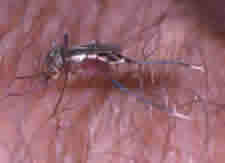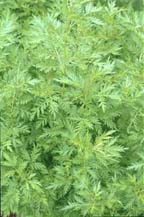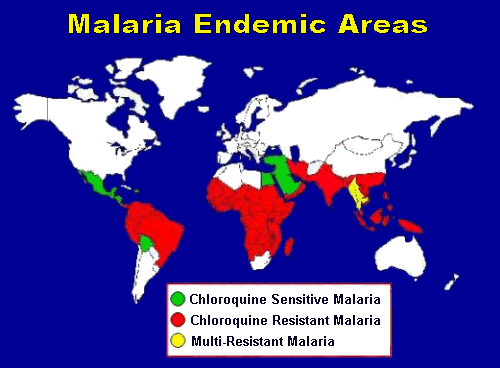Malaria Regimen
 Follow the Antiparasitic
Regimen and The Water
Cure. Use Nutricology Artemisinin or Eclectic Institute Para-Fight (formally known as Intestinal Support) and high dose Vitamin
C.
Follow the Antiparasitic
Regimen and The Water
Cure. Use Nutricology Artemisinin or Eclectic Institute Para-Fight (formally known as Intestinal Support) and high dose Vitamin
C.
Use the Antiparasitic Regimen using Eclectic Institute Para-Fight (formally known as Intestinal Support and Black Walnut Wormwood) or Nutricology Artemisia. Both
supplements contains an extract of wormwood annua, which is the single best agent to use against malaria. The extract of wormwood annua, also known as artermisia annua, sweet wormwood or sweet Annie, contains artemisinin. Artemisinin is an antiparasitic which crosses the intestinal 
However, research done in 2016 shows that a whole leaf extract of wormwood annua is more effective to combat the malaria pathogen that the active ingredient alone (artemisinin) although it is unknown whether adding the oil makes up for this. In the meantime, it is better to use a whole leaf extracts as found in the Eclectic product and Nutricology Artemisia, but not Nutricology Super Artemisinin.
To also ensure a quicker resolution, use the Water Cure, using the full amount of salt specified, and vitamin C.
The best treatment for malaria is prevention. Do everything possible to reduce the chance of mosquito bites when in infected areas. Use a high dose B complex internally, which seems to help repel the critters - in particular thiamin (vitamin B1) and to go all out, use a 100mg thiamin capsule every 8 hours. Also, using Artemisinin internally will help repel them. Use a good mosquito repellent topically. The best natural types contain essential oils like eucalyptus, lemon, citronella, lemongrass, and/or the two best oils for this purpose - catnip and lemon tea tree. If DEET or any other toxic type will instead be employed, first protect the liver with a silymarin product like Now Silymarin.
 |
Qinghaosu, dietary vitamin E, selenium, and cod-liver oil: effect on the susceptibility of mice to the malarial parasite Plasmodium yoelii. Levander OA, Ager AL Jr, Morris VC, May RG. Human Nutrition Research Center, US Department of Agriculture, MD 20705. Young female mice were fed torula-yeast-based diets deficient in vitamin E or selenium or supplemented with cod-liver oil to determine the effect of host antioxidant status on the therapeutic efficacy of the Chinese traditional antimalarial drug qinghaosu (QHS), a sesquiterpene endoperoxide. Vitamin E deficiency enhanced the antimalarial action of QHS against Plasmodium yoelii, both in terms of decreased parasitemia and improved survival but Se deficiency did not. A vitamin E-deficient diet containing 5% cod-liver oil had such strong antimalarial activity in itself that no additional therapeutic benefit of QHS could be demonstrated. Hematocrit values in parasitized mice treated with QHS or fed the cod-liver-oil-supplemented, vitamin E-deficient diet were normal. PMID: 2756922 [PubMed - indexed for MEDLINE] |
Rife Frequencies, Annotations, and Comments Malaria (an infectious disease, originating in tropical areas, that is transmitted by a mosquito bite and characterized by fever, anemia, and spleen enlargement. Also use wormwood annua. Also see Perniciosia) - 4, 20, 28, 222, 550, 713, 880, 930, 1032, 1433, 1444, 1445, 455, 743 |